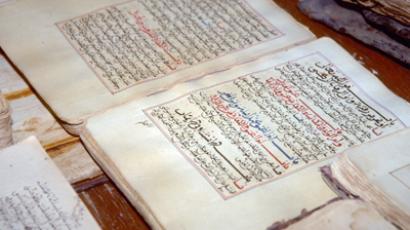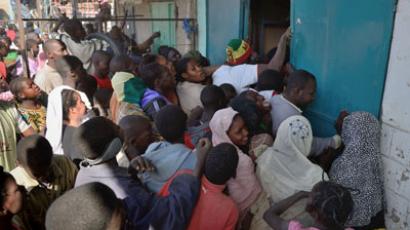Human rights abuses found in Mali as residents face malnutrition, lack of supplies
As the French military steps up its offensive in northern Mali, residents aim to repair the damage that airstrikes left behind – while fighting to overcome malnutrition. It comes as an investigation reveals human rights abuses in the region.
The violence which has encompassed northern Mali has put much of the country’s road traffic to a standstill, leading to a severe lack of food, medicine and fuel. The heath and food crisis is putting 18 million people at risk of malnutrition.It’s a situation that could have a devastating outcome.“In this part of the region, in Mopti, there are about 7,000 refugees. Children suffer the most. Unless medication is brought in, the centers treating malnutrition would face tragedy,” journalist Gonzalo Wancha told RT. Alternative sea routes are being tried to deliver supplies to Timbuktu via Niger and spread them to the north from there.“Negligence was the cause of malnutrition before, but now, amid this crisis, most children are suffering dizziness,” Emilia Some, from the Mopti Sanitar Center, said.
But malnutrition is just one of many worries affecting the people of northern Mali.An estimated 14 civilians have been killed in the town of Konna, Wancha reported.Residents of the town of Konna experienced tragedy firsthand, after aerial attacks struck their village.But the circumstances surrounding one particular airstrike – which killed at least four people – remain foggy. “We’ve been calling for a full investigation because French sources say the aerial strike launched by the French took place in the afternoon around 4pm. But what we’ve heard is that there was an aerial strike by a helicopter at 10am on January 11,” Tirana Hassan from Human Rights Watch told RT. And while innocent civilians continue to pay the price for freedom, the question of whether the region is actually in a worse state than it was before French troops arrived is up for debate.“Whether or not life is better now is a difficult one to say. People are still obviously living in a time of insecurity but what we know is that there have been [human rights] abuses,” Hassan said.
Those abuses include disappearances perpetrated by the Malian armed forces, which have taken place where they have arrested people and those people’s families have not been able to find them since.“We are calling for the Malian authorities and all parties to ensure that if there are individuals who have been arrested during the course of the security operations, that due process is followed. People cannot just be taken and then be kept and essentially be disappeared,” Hassan said.In addition to human rights abuses which have been previously committed, it appears there is a large possibility that violations will be taking place long after French troops leave the country. “There will be an opportunity for those who have suffered in the north to take revenge on those who they assume are associated with the Islamist groups. The potential victims of that are people from ethnic groups…whose houses have been ransacked, whose shops have been looted, and who have sometimes been targeted during security operations,” Hassan said.It’s that fear that has prompted Human Rights Watch to ask for the placement of human rights monitors on the ground. “This is not something we can wait for. There need to be proper patrols that are going around the cities which are now occupied to ensure that civilians living in those towns are safe and secure and there are no reprisal attacks,” Hassan said.














